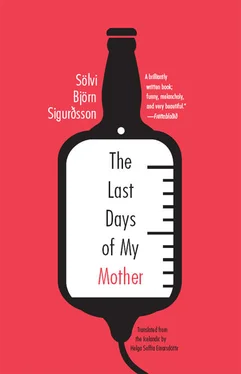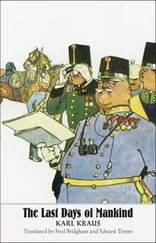“Go on, take a seat,” Tim finally said and made room for Van Österich. Then he stood up and said: “I’ve got some foie gras and white wine in the fridge. I’ll be back.”
“Now he needs to write,” Mother said. “That’s Tim for you. He’s always thinking and as soon as he gets an idea he’s off. Don’t you think his diligence is admirable, Mr. Van Österich?”
“Very,” the philosopher said with a grin. “Wallace and I have had our differences, as you might know.”
“Yes, and in those debates your arguments are always so childish. I don’t abstain from hashish if it makes me feel slightly better. I’m told I’m getting better; in fact I’m almost fit as a fiddle. What kind of Boy Scout are you to refuse people medicine to ease their suffering, just because it makes them a bit sentimental? I would have thought that was a positive. I just can’t remember seeing a child of your size before.”
“Eva,” I began, but that’s as far as I got because she was not going to miss a second in her assault on the Ostrich.
“Have you noticed, my dear friends,” she said and took a deep hit from the bong, “how brown the Ostrich’s nose is on the inside?”
“Enough, Eva.”
“No, it’s not enough. I believe that men who have the audacity to attack my Timothy must be heartless. How dare you, if I may be so bold to ask Mr. Philosopher, belittle Tim, who is writing this remarkable story?”
That’s how it had to be. Van Österich was Tim’s opponent in the ideological war on death, and so he was fair game to Mother.
“People have different opinions, Mrs. Briem. I do not buy into fleeing with the aid of drugs; it’s always been the basis of my theories that death calls for preparation in life. To bid adieu with dignity, people need to be in control of their lives. That’s my opinion.”
“And that is why you attack my dear Timothy? And maybe me, too?”
“We debate, that’s all. But you should be pleased, Mrs. Briem, that your treatment is successful. The longer the drug keeps you stable, the more alternative treatments will become available to you.”
Mother looked sheepishly at me and then asked the philosopher what he meant.
“There are several things in the pipelines that the doctor may not have mentioned to you. For example, the ‘Master Regulator’ should work on bone cancer. It may be on the common market as soon as next year. It’s sort of like a vaccine that attacks the tumor directly. You could live, Mrs. Briem, even though the Ukrain fails you.”
She seemed to deflate at this news. The philosopher’s kindness disarmed her and made her instantly mellow. In the end she stood up and pulled him aside for a private chat behind a nearby car. They said good-bye in the driveway, Van Österich mostly intact, Mother slightly humbled.
“I asked Össi to excuse my behavior,” she said as she sat down again. “It wasn’t right of me to give him such a hard time.”
“Össi?”
“Össi, yes. I think it suits him better,” she said, explaining how it wasn’t nice to speak so ill of someone who had decided to kill himself. Therefore the Ostrich would henceforth be Össi.
“Well, I did try to tell you that you were being pretty harsh.”
“It’s over and done with, Trooper. We separated in good spirits.”
Tim returned with the foie gras and wine just as Helga was about to take the stage. She gave a moving speech, the party was set, and everyone clapped for the future of Lowland. Mother and I made a toast to her birthday and Icelandic independence, while her fellow patients cheered a triple hurrah for Iceland’s Lady of the Mountain, Eva Briem Thórarinsdóttir. The doctor joined us and led the singing.
“Come with me, Willyson,” he whispered and pulled me away before the cheering died out. He was in good humor and walked briskly across the lawn, claiming to have something to show me. “You won’t be disappointed, I tell you. This is a glorious day, a glorious day indeed. Oh, did I mention that Helga has found an excellent Icelandic bank for our donation?”
“No!” I couldn’t help myself. It was depressing to imagine the center’s newfound fortune being spent on funding Danni Klambra’s latest fiasco.
“You don’t approve? I understand they offer the best interest rates in the country.”
“Right,” I said, nodding my head, unsure whether I should interfere. Inside the building the summer light crept between rooms, lighting up the colorful walls. I’d always liked the old house; there was very little reminiscent of the atmosphere I was used to finding in clinics and hospitals. The first floor was like a country home, with painted wooden furniture, bookshelves, and all sorts of upholstered sofas. This changed when we went down into the basement. We walked through a white, narrow stairwell into a fluorescent lab with steel cabinets and tables. This was where Frederik did his research, away from the outside world, growing fungi and keeping records.
“Look!” He held a test tube filled with clear liquid. “It’s changed since this morning. Spore from Mr. Wallace. It’s just wonderful to monitor his inner organs. I don’t think I’ve ever had such a great opportunity to keep a record of the effects of Sativa and phenethylamines on cancer cells.”
“Aren’t the drugs bad for him?”
“I’m always surprised by how much the human body tolerates. Wallace has been generous with the Sativa and hasn’t spared the phenethylamine. I’ve told him it might reduce his time on earth but he doesn’t care. His main concern is getting through the day.”
“So this is some sort of research into the side-effects of happiness?”
“You could say that. Wallace has given me permission to publish my findings. Timothy truly is a treasure!”
He put the test tube away and walked to a large room leading off the lab. Glass cabinets stood along the back and the shelves sprouted an assortment of old tools, instruments, and jars.
“So, here we have what I wanted you to see.” He produced a little glass flask with something that looked like slimy seaweed; I thought it might be a bit of infected liver. “Your Black Beauty,” he said, handing the flask to me. “It has grown and prospered like the flowers of summer. I’m sure it’s the most magnificent Afrandarius erpexoplexis in the Northern hemisphere — it has surpassed both the Ferflexus antarticus and the Norgonakis felenferosis . I’m not sure anyone would like to have it on their face at the rate it’s growing.”
“I’m overcome with grief.”
“You’re joking, my good man, jolly good! I thought it would be nice for you to see it before you returned to the city. We humans are never alone, you know.” He went on to explain how we are in fact not a single organism as most people like to think, but many, millions of coexisting organisms; the human body was more like a planet than an individual being. The heart was the sun and the brain the weather system, and the stuff in between was held together by diversity, the great cohabitation of the life units that made up every person. That’s where the support from our miniscule friends, such as bacteria and fungi, really counted. “But then there are foes too, as you well know. These little terrorists are a real plague. I’ve seen many of them in my work, I’ve conquered some, surrendered to others. And so it is truly wonderful to have this new hope for Mrs. Briem.”
We walked outside again, onto the lawn where Helena sat reading the same paperback she had been reading in Pleasure Fountain in the spring.
“Hi there,” she said. “I was waiting for you so I could introduce your mother to Duncan. You just missed him.”
“Really, Mr. Milan Kundera himself?”
Читать дальше












